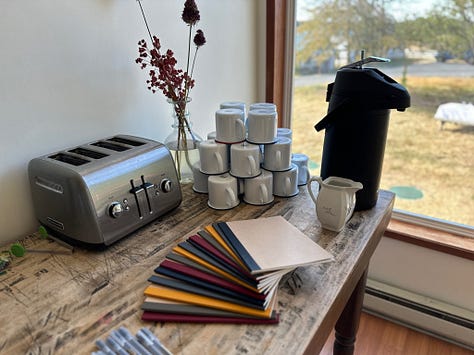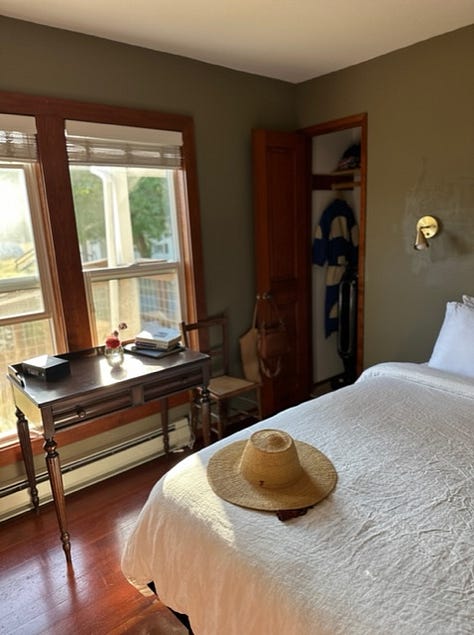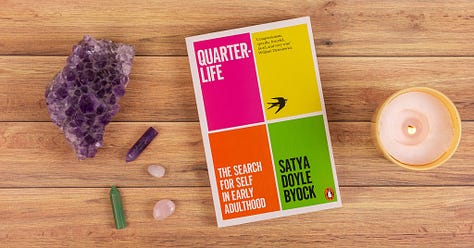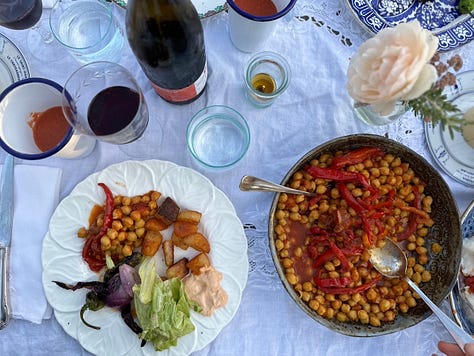My retreat for Quarterlifers on the stunning San Juan Island, Washington is June 19-23rd. Beautiful surroundings, wonderful people, incredible food. Our scholarships spots are now filled, but registration only requires a deposit for now. Send us a note soon if you think you’d like to join. Spots are filling up!
My next workshop for paid subscribers is on Sunday, April 28th at 10am PDT | 6pm UK—registration link is in the email footer. This will be a mini-workshop in advance of my six-week seminar on community dreamwork starting May 10th. So many things happening! Come hang!
When my book, Quarterlife, first came out, a dear friend shared it immediately with her twenty-two-year-old daughter, whom I’ll call June.
Throughout her teen years, June had struggled to feel “normal”, to fit in socially, and to engage in daily life. There was a long stretch, almost three years, in which she largely stayed in bed. She seemed to be in a deep depression, yet that term didn’t quite fit. Her behavior evoked the mysterious Sleeping Beauty syndrome in which young people seem unable to wake up, despite there being no clear physical cause. Indeed, June’s symptoms weren’t ever terribly clear and the necessary interventions were elusive. No matter who they consulted or what path they went down, June’s parents could not find a single diagnosis to explain everything—or anything.
In many ways, June wasn’t depressed.x She was just struggling to function and—maybe more than anything—to care about functioning. As I heard updates on her condition from time to time, I couldn't help but wonder what invisible inner switch existed for June that only she could uncover and flip on.
When June read my book, she wrote me a very touching note about how transformative the framework had been. Through it, she’d discovered language that made a great deal of sense to her. She subsequently “diagnosed” herself as a Stability Type, one who’d had a very early crisis. In other words, June felt that she’d powered through school and excelled as a child but had burned out as a young teen. None of what she’d been so focused on made any sense to her anymore. While June had long appeared to everyone around her as a Meaning Type, floundering to step into the expectations of “adulting” and unable to leave home, her self-diagnosis was that this phase had come after a stretch in which she’d felt entirely functional. She’d just hit a wall. Something had broken. She wasn’t sure how to put things back together again. But after reading my book, she felt she could see more clearly what had happened and how she could take a step forward to healing.
After many false starts, June finally found a therapist who she felt got her, as well as a psychiatrist who had the patience to explore with her various medications to see what would work. Since no one knew entirely what was going on for June, she needed clinicians who were in it for the long-haul and had the ability to think a bit outside of the box. June’s family, meanwhile, had the financial and emotional resources to support her, a benefit that we know is not available to the majority of people, all of us struggling to find compassionate care in an overburdened and dysfunctional healthcare system.
June began to self-identify as neurodivergent. She found medications that made a difference in how she felt and began being able to function day-to-day more easily. She started to steadily rebuild a life that would meet her needs and help her get out of bed in the morning. She got an emotional support dog to help regulate her nervous system and manage anxiety. Things began to improve. June started to work part-time. She was moving in the right direction. And yet, one significant piece of the puzzle still wasn’t coming into place: June had no interest in leaving home.
Her mother sent me an email asking again for any guidance I could offer:
“She keeps mentioning the one piece of your book she couldn't relate to: the Separation piece. She said that in all your examples, people wanted to separate from their families. But she really, really doesn't. Her dad and I have googled the heck out of ‘child won't grow up’ and nothing is helpful there. All the stuff we read assumes a lack of true connection with the adult child or a kid who is belligerent or reckless. That isn't our situation.
Today she said straight out for the first time: “I don't want to grow up and I don't know why or how to change it.”
And there it was, the phrase that I’d anticipated was inside of June all this time but never articulated: I don’t want to grow up.
June was beginning to see for herself the level at which she had dug her nails into the ground, refusing to be pulled along by time. It had barely been conscious to her, certainly. It wasn’t willful so much as an unconscious determination to avoid the inevitable: adulthood; independence. June had no innate desire to leave home. I don’t know why or how to change it.
The piece that hadn’t made sense to her in my book is the chapter on the need to Separate—one of my pillars of Quarterlife development. It’s the psychological need to adjust one’s life externally and internally away from the caregivers and the belief systems of childhood. This is, arguably, the core requirement of being a psychological adult.
It’s different for everyone, of course. There’s always nuance in individual development. One person may live 1,000 miles from home but still require constant financial support from their parents and, therefore, feel guilty about making decisions that don’t align with their parents’ wishes. Another person may have no financial ties to their parents but experience so much judgment from them that they struggle to clarify their own values and desires. Another person may live at home because there’s no feasible way for them to move out (the cost of living has skyrocketed without a comparable rise in wages), so they don’t know how to sort out truly becoming a separate person from their parents. Yet another may have been orphaned young and, without fully grieving and processing the fear of being alone, is perpetually living in the shadow of their parents’ lives, trying to live up to who they were or become who they couldn't.
But June wasn’t struggling with any of this.
Her parents were alive and well. She loved them and loved living at home. She liked their company, felt safe and well-cared for, and could see herself staying just like that for many years. She didn’t want to move out. That was that.
Did I think something was actually wrong with this? Her mother asked me over drinks. If June felt perfectly content, was there any issue here, really? Despite her and her husband longing in some way to be child-free, was there a problem to be solved? Yes, I told her. Cultural and economic differences can define a person living with their parents well into adulthood. But in June’s case, the issue remained: she didn’t want to grow up. That was a problem.
And then, without a great deal of planning, her parents left town.
June hadn’t often been left alone. She had been doing so much better, though, and an opportunity had arisen for her parents to make a child-free trip practical and attractive. When they told her about their plans, June was worried. No: she was angry. She felt abandoned; left behind. She felt scared that she wouldn’t be okay alone. She argued with them and begged them to stay. But they left anyway. They pushed past their own fears of abandoning her and they left. For a month.
June’s anger lasted two weeks. They heard about it and they didn’t rush home. They endured various messages and panic, but trusted that their daughter would be alright. And then, suddenly, she was. June felt better. She wasn’t angry anymore. The messages quieted down and June seemed fine.
When her parents returned, they were shocked to discover that she didn’t want them back. June was shocked too. She expressed suddenly feeling young in their presence, too young. In one month of sink or swim, she’d uncovered the joy of self-reliance. She’d been forced to survive on her own and she did. An initiation had occurred. June learned to trust herself. She suddenly felt more grown-up and confident.
June soon announced that she needed to move out. She couldn’t continue to feel this small after what she’d learned. “I can’t move on from here,” she told them. “I can’t get to where I need to go from this house.” Without assistance, she found an apartment in the area and called the landlord to ask about applying. A bit of synchronicity arrived like a tailwind and the perfect living situation fell into place. She was living on her own within weeks.
June had initially kicked and screamed in terror but ultimately had writhed out of an old skin and into a new one. She’d found the invisible switch and turned it on. She began, unexpectedly, to grow herself up in a way that only she could.
Classes & Events Coming Up:
Sunday, April 28: My next workshop for paid subscribers of Self & Society at 10am PDT | 6pm UK (Paid subscribers, look below to your email footer for the registration link. Send me a DM if you only use the app.)
Friday & Saturday, May 3rd + 4th: The Christiana Morgan Lecture and a Workshop on Christiana Morgan, her Tower, and Papers, Brunswick, Maine.
Friday, May 10th—: A six-week seminar on Community Dreamwork. Online. Paid subscribers to Self&Society get 15% off registration.
Wednesday, May 15: In conversation with the fabulous
at Up Up Books, Portland, Oregon. 6:30pm. (This is a ticketed event with limited space.)Sunday, May 26th: Gathering for paid subscribers of Self & Society at 10am PDT | 6pm UK - save the date!
June 19-23: A retreat on San Juan Island for Quarterlifers on the journeys of initiation, transformation, and the summer solstice with exquisite food by chef
.











Sometimes we just need to not be given a choice to show we CAN do it, that we show ourselves that we have self-worth and can trust ourselves. Thank you for this. Lynne
Wow! How lovely that your book spoke to this young person, acting as a catalyst, when nothing else did.